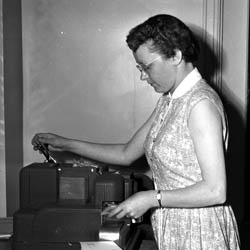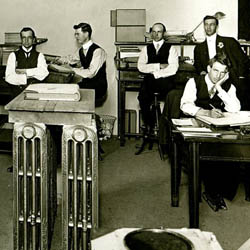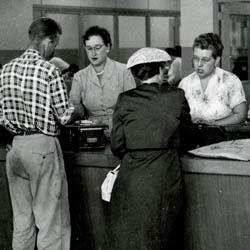An office is a place of business where clerical and professional duties are performed. This exhibition focuses on office jobs which traditionally have been seen as working class, and excludes office employees with professional or managerial status. One writer has characterized this type of work as generally involving the performance of routine tasks with a minimum of autonomy. Workers depicted on this page and in The Office gallery include clerks, secretaries, stenographers, typists, administrative assistants, bookkeepers, receptionists and telephone operators. Under their various titles they constitute one of the largest occupational classes in Saskatchewan, and one of the few in which female workers have long predominated.
Since at least World War I many Saskatchewan women have found full and part time employment in the clerical sector. As opportunities for employment expanded typing and other commercial training began to be offered at some high schools. Many young women pursued their education after high school at private business academies or secretarial schools. Among the subjects offered were typing, shorthand and dictation, bookkeeping, filing systems, business protocol, commercial correspondence and the operation of office equipment. Additional specialized courses were available for those seeking work in medical and legal offices.
The responsibilities of clerical workers commonly include record keeping, filing, and staffing service counters. They may answer and screen phone and email messages, process incoming and outgoing correspondence, receive and direct visitors, schedule appointments, maintain and repair office equipment, and troubleshoot computer and software problems.
During the last quarter of the 20th century office work was revolutionized by new technology including the adoption of photocopiers, fax machines, scanners, and word-processing and electronic accounting programs. It is now the expectation that most managerial staff will deal directly with inquiries through email and voicemail technology and that they will word-process most of the documents that would once have been prepared by secretaries or clerical assistants.
With many traditional clerical tasks now transformed by labour-saving technology there is less need and demand for personal secretaries. The office typing pool is but a faint memory. Increasingly offices are staffed by a new breed variously described as executive or administrative assistants, or office coordinators. In addition to the traditional clerical functions these assistants often assume more responsible duties including the preparation and supervision of budgets, the creation and maintenance of websites, and the arrangement of meetings and social events.
National Secretary's Day was created in 1952 with the goal of encouraging more women to become secretaries. The idea caught on, and is now celebrated in Canadian offices during the last week of April. It has now been retitled Administrative Professional's Day to better reflect the increased responsibility of most office workers.
Unions, including CUPE (Canadian Union of Public Employees) and SGEU (Saskatchewan Government and General Employees' Union) have been successful in organizing clerical and related workers in most large public service workplaces. Organizing smaller offices in the private sector has been less successful, hindered by the temporary or part time status of many of these employees.


![Land Titles Office, ['ca. 1913 or 1914']](cropthumbs/R-A21768.jpg)
![Saskatchewan Wheat Pool Staff Office Scene, ['192-?']](cropthumbs/MG247-S10-Album-F2-1.jpg)
![Office Workers at the John East Iron Works, ['1940']](cropthumbs/A-803.jpg)
![Punching a Timeclock, ['ca. 1950']](cropthumbs/R-A18579.jpg)


![Office Workers at Desks, ['ca. 1946']](cropthumbs/B-867.jpg)


![SaskTel Operators, ['ca. 1940s']](cropthumbs/B-6596.jpg)
![Bank at Duval, ['ca. 1913']](cropthumbs/R-A12695.jpg)